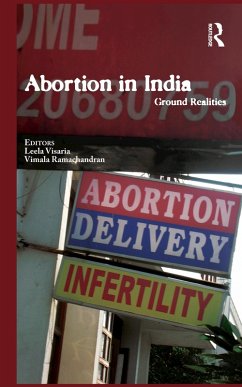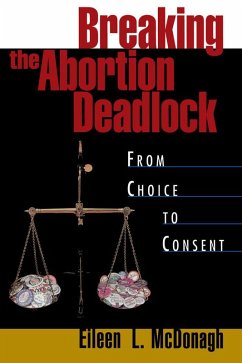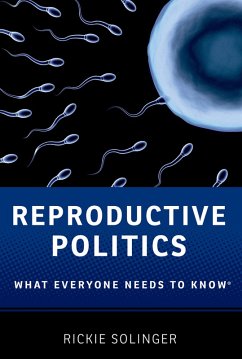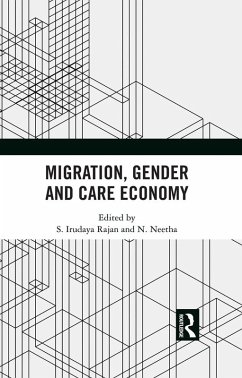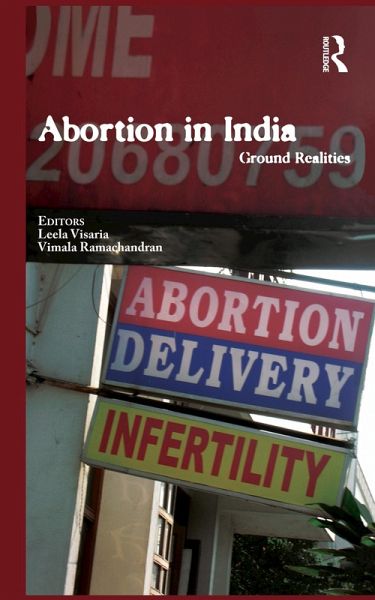
Abortion in India (eBook, PDF)
Ground Realities
Redaktion: Visaria, Leela; Ramachandran, Vimala
Versandkostenfrei!
Sofort per Download lieferbar
48,95 €
inkl. MwSt.
Weitere Ausgaben:

PAYBACK Punkte
24 °P sammeln!
India was a pioneer in legalizing induced abortion, or Medical Termination of Pregnancy (MTP) in 1971. Yet, after three decades, morbidity and mortality due to unsafe abortion remain a serious problem. There is little public debate on the issue despite several national campaigns on safe motherhood. Instead, discussion on abortion has mainly centred around declining sex ratio, sex-selective abortion, and the proliferation of abortion clinics in urban areas. Adding to the problem is that abortion continues to be a sensitive, private matter, often with ethical/moral/religious connotations that se...
India was a pioneer in legalizing induced abortion, or Medical Termination of Pregnancy (MTP) in 1971. Yet, after three decades, morbidity and mortality due to unsafe abortion remain a serious problem. There is little public debate on the issue despite several national campaigns on safe motherhood. Instead, discussion on abortion has mainly centred around declining sex ratio, sex-selective abortion, and the proliferation of abortion clinics in urban areas. Adding to the problem is that abortion continues to be a sensitive, private matter, often with ethical/moral/religious connotations that sets it apart from other reproductive health-seeking behaviour.
This book fills a gap in our understanding of the ground realities with respect to induced abortion in India to create an evidence-based body of knowledge. Using both quantitative and qualitative research methods, the case studies show why and under what circumstances women seek abortion and the quality of services available to them. They also explore inter-generational differences in attitudes and practices, the perceptions and selection of providers, female-selective abortion, and informal abortion practitioners. Among other issues, the contributors show that strong preference for sons, availability of modern techniques for diagnostic tests, widespread acceptance of the small family norm, and heavy reliance on female sterilisation as the primary method of contraception lead women to abort unwanted pregnancies.
A book that goes beyond the smokescreen of data and regulations to unravel the human story behind elective abortion, it will be of interest to those studying health, public policy, and gender, apart from the general reader.
This book fills a gap in our understanding of the ground realities with respect to induced abortion in India to create an evidence-based body of knowledge. Using both quantitative and qualitative research methods, the case studies show why and under what circumstances women seek abortion and the quality of services available to them. They also explore inter-generational differences in attitudes and practices, the perceptions and selection of providers, female-selective abortion, and informal abortion practitioners. Among other issues, the contributors show that strong preference for sons, availability of modern techniques for diagnostic tests, widespread acceptance of the small family norm, and heavy reliance on female sterilisation as the primary method of contraception lead women to abort unwanted pregnancies.
A book that goes beyond the smokescreen of data and regulations to unravel the human story behind elective abortion, it will be of interest to those studying health, public policy, and gender, apart from the general reader.
Dieser Download kann aus rechtlichen Gründen nur mit Rechnungsadresse in A, B, BG, CY, CZ, D, DK, EW, E, FIN, F, GR, HR, H, IRL, I, LT, L, LR, M, NL, PL, P, R, S, SLO, SK ausgeliefert werden.




